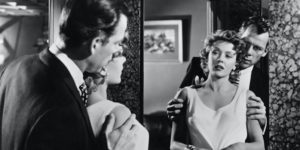Otto Penzler ranks, analyzes, & celebrates the 106 greatest crime films of all-time. Catch up on the series and find new installments daily here.
__________________________________
The Big Heat (1953)
__________________________________
TYPE OF FILM: Detective/Noir
STUDIO: Columbia
PRODUCER: Robert Arthur
DIRECTOR: Fritz Lang
SCREENWRITER: Sydney Kiernan
SOURCE: The Big Heat, novel by William P. McGivern
RUNNING TIME: 90 minutes
PRINCIPAL PLAYERS:
Glenn Ford…………………………………………………………..…….Sergeant Dave Bannion
Gloria Grahame……………………………………………………………………….Debby Marsh
Jocelyn Brando………………………………………………………………………Katie Bannion
Alexander Scourby……………………………………………………………………Mike Lagana
Lee Marvin…………………………………………………………………….………Vince Stone
Jeanette Nolan………………………………………………………………………Bertha Duncan
Peter Whitney……………………………………………………………………………….Tierney
__________________________________
DID YOU KNOW?
__________________________________
The Big Heat is the last of the classic noir films, using all the genre’s conventions and going as far as a first-rate film could go with them. In showing the corruption of an entire city and the efforts of a single man to restore order, it was, oddly, the last film under the wire before Senator Joseph McCarthy convinced Americans (and the film industry) that is was more important to look for villains outside the borders of America rather than inside them.
__________________________________
THE STORY
__________________________________

After a police officer commits suicide, his wife removes his confession note and uses it to blackmail Mike Lagana, the enormously wealthy and powerful gangster who essentially controls the city. Homicide detective Sergeant David Bannion is assigned to investigate the suicide and learns that the dead cop had been taking payoffs from crooks and corrupt officials. As Bannion digs deeper, he is ordered off the case, but when the dead cop’s girlfriend gives him evidence, he becomes more determined than ever to uncover the corruption.
When the girl’s tortured body is discovered, Bannion confronts Lagana, who retaliates by planting a bomb that accidentally kills Bannion’s wife in the tough cop’s car. His superiors remove Bannion from the police force, but he takes his gun with him and goes on a single-handed mission to bring down the underworld boss, his organization, and the corrupt officials who allow it to flourish.
Bannion enlists the help of Debby Marsh, the girlfriend of Lagana’s hit man, Vince Stone, who is scarred when Stone, who suspects (rightly) that Debby is overly fond of the cop, flings coffee in her face. She determines that killing the blackmailing widow will release the suicide note and destroy the syndicate, so she shoots her. She then confronts Stone and flings her own scalding coffee at him and gets shot. Bannion arrives too late to save her but arrests Stone, resisting the temptation to kill him on the spot. Debby dies in his arms, but the corruption is uprooted and Bannion returns to the police force.
***
The Big Heat can be compared with the classic American literary and film archetype, the western, with its lone hero moving into a crime-ridden town and cleaning it up. Questions of due process and the legality of various actions seem out of place in such a context, when the forces of evil seem overwhelming and immutable. To attempt to maintain the use of the system, when the system has been preempted by the bad guys, seems foolish and hopeless, as western marshals and Dave Bannion understood.
The noir style was perfectly suited to the German-born director Fritz Lang, who had garnered worldwide praise for his grotesque post-expressionist filming of Dr. Mabuse, King of Crime and M.
Although Gloria Grahame had won an Oscar for her role as Best Supporting Actress in The Bad and the Beautiful (1952) and been nominated in the same category for Crossfire, 1947), her portrayal of the party girl Debby Marsh is generally recognized as her finest performance.
__________________________________
BEST LINE
__________________________________
Debby Marsh, as she enters Bannion’s seedy motel room: “Hey I like this. Early nothing.”





















